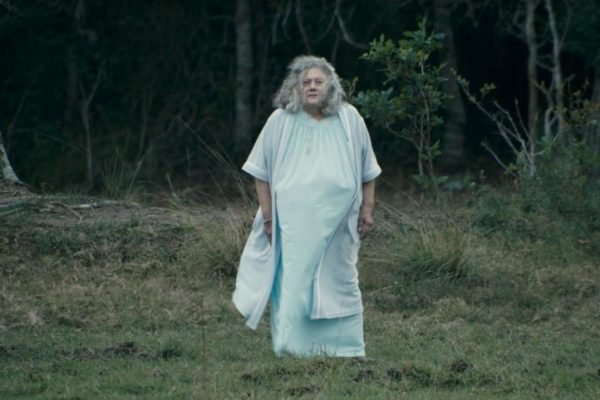In the opening line of Anna Karenina, Tolstoy famously said that: “every unhappy family is unhappy in its own way.” Xia Magnus‘ impressive debut feature Sanzaru refutes the count’s maxim, intertwining the fortunes of two families from opposite ends of the planet to show that horrid truths are universal. This modest, melancholy spin on the haunted house tale is drenched in American gothic and some good old melodrama – a Texan Manderley.
Evelyn (Aina Dumlao) is a hospice nurse from the Philippines who works as a live-in carer for Dena (Jayne Taini) firmly in the grip of dementia. Evelyn’s nephew Amos (Jon Viktor Corpuz) also moves in, to give his mother a break after a fight at school leads to his suspension. The two women have a cordial bond in Dena’s lucid periods, but the elder becomes increasingly terrified during her frequent bouts of illness. Evelyn puts these incidents down to dementia eroding Dena’s sense of self, but as the uncanny sensations begin to permeate the house more fully, she starts to doubt her own sanity.
Although Magnus is swift to introduce metaphysical elements Sanzaru excels when it lingers on its damaged human characters and their all-too recognisable issues. It’s not hard to empathise with Dena’s fear as her mind fails as rapidly as her body. Does she even know herself whether she’s experiencing a genuine haunting, or is her brain trying to desperately make sense of her past even as it unravels? And who would believe the terror of a failing old woman when odd things begin to happen?
Dena’s son Clem (Justin Arnold) lives across from the house in a trailer. He’s also troubled. Is the hearing aid he wears a clue to some trauma? The fact he cuts his own thighs surely is. Young Amos seems slowly crushed by some unfathomable weight. He barely eats yet constantly exercises to the point of collapse. The four characters are capable of interacting with each other – there are even sparks of attraction between Evelyn and Clem – but their loneliness and isolation are palpable.
That isn’t to say that the more ethereal moments are not also effective. For the most part, they are used as augmentation for the already fraught atmosphere and characterised by their subtlety; whispering voices from rickety air vents and the urgent cheep of hair-trigger smoke detectors. Eventually, the malignant apparition manifests as a naked, glowing red demon – a similar image to that utilised by Carlos Reygadas in Post Tenebras Lux. But again, is this figure a genuine haunting, or some awful fragment of the past twisted into diabolic form by nightmare and dementia? Magnus is not aiming for jump scares, but to question whether supernatural forces are creating the oppressive atmosphere in the house or vice versa, or if there is a symbiotic relationship between the two.
With Sanzaru‘s structure based around dormant family skeletons clawing themselves to the surface, you can quickly figure out the area in which the horror will lie. Especially as just about every modern familial drama since Vinterberg‘s Festen travels a similar path. While Magnus displays almost infinite patience laying breadcrumbs along this path for the viewer, he rather unceremoniously bundles the witch into the oven. Nevertheless, he shows considerable skill as a writer to reconcile his elliptical and ambiguous approach with a story that coheres into a satisfying whole. Dumlao and Taini anchor it all with believable performances, with Taini a standout as Dena, whose dementia is bringing to the surface all the old trauma her healthy brain had to some extent blocked.
Sanzaru may finally tip towards melodrama – albeit of the most subdued kind – but ultimately succeeds as a ghost story concerned with the situation in the present as well as the phantoms of the past. Delicate, deeply empathetic and possessed of genuine humanity for all its melancholy tone and crepuscular framing, Xia Magnus’ debut is a hell of a calling card.
Screening as part of Fantasia Festival
